Jagdish Bhagwati, renowned professor, member of UN Secretary General Kofi
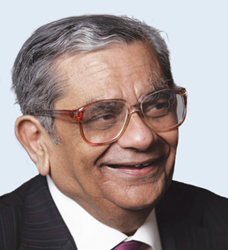
Annan's High-level Advisory Group and the External Advisor to the Director General World Trade Organisation (WTO), is regarded as one of the foremost international trade economists of his generation.
He was born in Mumbai, India in the year1934. He did his B.com from Mumbai in 1954 and post graduated in l956 from Cambridge University with a first in Economics Tripos. He then did his Ph.D at MIT (Massachusetts Institute of Technology) in 1967. After studying in England and the United States, Bhagwati returned to India in 1961 and served as Professor of Economics at the Indian Statistical Institute, and then as Professor of International Trade at the Delhi School of Economics. He returned to MIT in 1968, leaving it twelve years later to join Columbia, as the Ford International Professor of Economics. Bhagwati is one of the only 10 scholars who hold the title of University Professor at Columbia.
Professor Bhagwati has made major contributions to pure theory and is engaged with major practical policy problems as Economic Adviser to the Director-General of GATT(1991-1993) and Special Adviser to the United Nations on Globalisation. He is a Fellow of the Econometric Society and has been elected a member of the American Philosophical Society, and the American Academy of Arts and Sciences.
He also writes regularly for The New York Times, The Wall Street Journal and The Financial Times. He has written or edited 40 books, written hundreds of articles, and founded and edited two journals, 'Economics and Politics' (1989) and 'The Journal of International Economics' (1971), the premier journal in the field today. Among his famous books are 'In Defense of Globalization' (2004);'Free Trade Today' (2002);'The Wind of the Hundred Days' (2000);'A Stream of Windows' (1998);'India in Transition' (1993);'World Trading System at Risk' (1991);'Protectionism' (1988); 'Economics & Politics' (founder-editor); 'The Journal of International Economics' (founder-editor) etc.
He has been honored with Honorary D.Litt degrees from several universities they are, Erasmus (Netherlands) and Sussex (UK), South Gujarat University. Among the awards he has received are the Mahalanobis Memorial Medal ( India ), the Bernhard Harms Prize (Germany), the Kenan Prize (USA), the John R. Commons Award (USA), the Freedom Prize (Switzerland), and the Frank E. Seidman Distinguished Award in Political Economy (USA). Professor Bhagwati has delivered many prestigious lectures, among them are the Frank Graham Lecture at Princeton , the Bertil Ohlin Lectures at the Stockholm School of Economics, the Harry Johnson Lecture in London, the Eyskens Lectures in Belgium, the Radhakrishnan Lectures in Oxford, and the Prebisch Lecture at UNCTAD IX in Johannesburg.
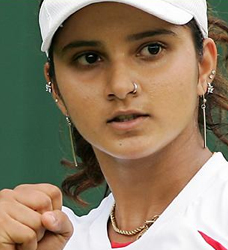 The young Indian women tennis sensation Sania Mirza, was born in Mumbai on November 15, 1986. Presently the highest ranked Indian, Sania started playing Tennis at the tender age of six at the Nizam club in Hyderabad
The young Indian women tennis sensation Sania Mirza, was born in Mumbai on November 15, 1986. Presently the highest ranked Indian, Sania started playing Tennis at the tender age of six at the Nizam club in Hyderabad 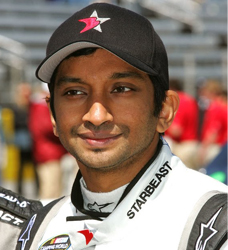
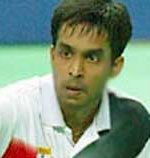 Nagandla in Prakasam district of Andhra Pradesh, India to parents Pullela Subhash Chandra Bose and Subbaravamma who were both interested in sports. Gopichand is indeed a story of sheer hard work, dedication and pure determination for the game of Badminton.
Nagandla in Prakasam district of Andhra Pradesh, India to parents Pullela Subhash Chandra Bose and Subbaravamma who were both interested in sports. Gopichand is indeed a story of sheer hard work, dedication and pure determination for the game of Badminton. 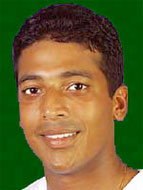 volleys. He was born on 7th June, 1974 in Madras, Tamilnadu. Bhupathi was educated in Dubai, Muscat and in USA. His father Mr. C.G. Krishna Bhupathi coached him right from his formative years, exclusively on hard courts in the Middle East and his son has proved that hard work pays.
volleys. He was born on 7th June, 1974 in Madras, Tamilnadu. Bhupathi was educated in Dubai, Muscat and in USA. His father Mr. C.G. Krishna Bhupathi coached him right from his formative years, exclusively on hard courts in the Middle East and his son has proved that hard work pays. 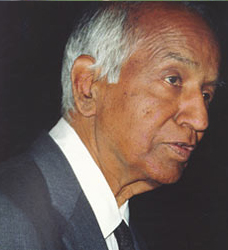 (now in Pakistan) to parents Chandrasekhara Subrahmanya Ayyaa civil servant and Sita Balakrishnan. Being the nephew of the great, C.V. Raman, a Nobel Prize winner in Physics young Chandrashekhar's interest in the subject came naturally to him.
(now in Pakistan) to parents Chandrasekhara Subrahmanya Ayyaa civil servant and Sita Balakrishnan. Being the nephew of the great, C.V. Raman, a Nobel Prize winner in Physics young Chandrashekhar's interest in the subject came naturally to him. 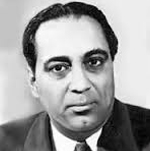 'Father of Indian Nuclear Science'.
'Father of Indian Nuclear Science'. 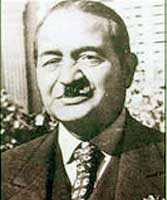 He was born in Bera, Punjab. After completing his M.Sc in India he went to England on a fellowship. On his return he served as a professor in Benaras Hindu University. He used to spent all his spare time in his
He was born in Bera, Punjab. After completing his M.Sc in India he went to England on a fellowship. On his return he served as a professor in Benaras Hindu University. He used to spent all his spare time in his 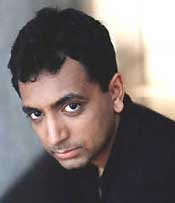 Pondicherry. His parents Nelliyate C Shyamalan and Jayalakshmi were both doctors and the family moved to the United States when Shyamalan was still a young boy and he was raised in a suburban area of Penn Valley of Philadelphia. He had his early education at a Catholic Private School and Philadelphia's Episcopal Academy. Although he received scholarships to several medical schools, Shyamalan chose to attend the Tisch School of Arts at New York University to study
Pondicherry. His parents Nelliyate C Shyamalan and Jayalakshmi were both doctors and the family moved to the United States when Shyamalan was still a young boy and he was raised in a suburban area of Penn Valley of Philadelphia. He had his early education at a Catholic Private School and Philadelphia's Episcopal Academy. Although he received scholarships to several medical schools, Shyamalan chose to attend the Tisch School of Arts at New York University to study 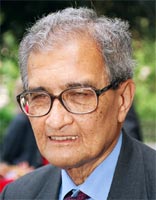 he was shocked to see people dying of hunger on the streets of Calcutta yards away from shops stocked with food. Three years later in Dhaka a Muslim labourer was killed in communal riots outside his house. The traumatic incidents directed Sen to a relentless study of the economic mechanism underlying famines and poverty.
he was shocked to see people dying of hunger on the streets of Calcutta yards away from shops stocked with food. Three years later in Dhaka a Muslim labourer was killed in communal riots outside his house. The traumatic incidents directed Sen to a relentless study of the economic mechanism underlying famines and poverty. 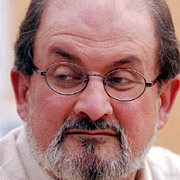 of Bombay and later migrated to Great Britain. Some of his well known books are 'Rome', ' Midnight's Children', ' Haroun and the sea of Stories' and the 'Moor's Last Sigh'. He commented against India in ' Midnight's Children' and made some critical references about Islam in ' Satanic Verses'. He created a world-wide furore and commotion with the publication of his book ' Satanic Verses'.
of Bombay and later migrated to Great Britain. Some of his well known books are 'Rome', ' Midnight's Children', ' Haroun and the sea of Stories' and the 'Moor's Last Sigh'. He commented against India in ' Midnight's Children' and made some critical references about Islam in ' Satanic Verses'. He created a world-wide furore and commotion with the publication of his book ' Satanic Verses'. 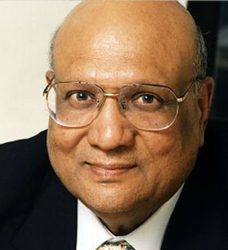 Swraj was educated at Punjab University and obtained a master's degree in mechanical engineering from the Massachusetts Institute of Technology (MIT) in the US. In 1953 he returned to India to join the Apeejay Surrendra Group, founded by his father, which he helped build up to a diversified industrial group. Swraj went to England in 1966 hoping to find a cure for his leukemia-stricken two-year-old daughter, Ambika. Shattered by her death, he buried himself in work and there began his spectacular business career in Britain.
Swraj was educated at Punjab University and obtained a master's degree in mechanical engineering from the Massachusetts Institute of Technology (MIT) in the US. In 1953 he returned to India to join the Apeejay Surrendra Group, founded by his father, which he helped build up to a diversified industrial group. Swraj went to England in 1966 hoping to find a cure for his leukemia-stricken two-year-old daughter, Ambika. Shattered by her death, he buried himself in work and there began his spectacular business career in Britain. 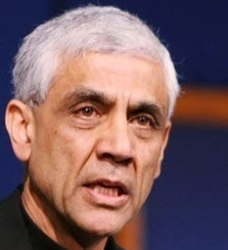 st influential personalities in Silicon valley. He is a partner in the venture capital firm Kleiner Perkins Caufield & Byers. Aged 50, he was among the first venture capitalist to understand that internet technology and fiber optics could make communications so fast, cheap and easy and spot the potential of companies that sell gear for high-speed optical networks.
st influential personalities in Silicon valley. He is a partner in the venture capital firm Kleiner Perkins Caufield & Byers. Aged 50, he was among the first venture capitalist to understand that internet technology and fiber optics could make communications so fast, cheap and easy and spot the potential of companies that sell gear for high-speed optical networks.  University of Madras, India, in 1958 and a Master's degree in technology from the University of New South Wales, Australia, in 1960. He received a doctor's degree in Computer science from Stanford University in 1966 and the same year began his academic career as an Assistant Professor in the same University.
University of Madras, India, in 1958 and a Master's degree in technology from the University of New South Wales, Australia, in 1960. He received a doctor's degree in Computer science from Stanford University in 1966 and the same year began his academic career as an Assistant Professor in the same University. 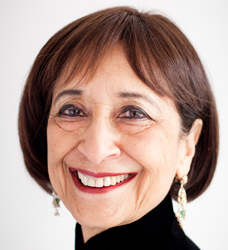 She went to England on a scholarship to learn acting and after graduation married Jaffrey. She settled down in New York and gave birth to three daughters, Meera, Zia and Sakina. She began her career in films with the Ivory-Merchant production, 'Shakespeare Wallah' winning her the best actress award at the Berlin Film Festival in 1965. Some of her other films are 'Heat & Dust', 'Autobiography of a Princess', 'The Assam Garden', 'The Perfect Murder', 'Six Degrees of Separation' and 'Wolf'.
She went to England on a scholarship to learn acting and after graduation married Jaffrey. She settled down in New York and gave birth to three daughters, Meera, Zia and Sakina. She began her career in films with the Ivory-Merchant production, 'Shakespeare Wallah' winning her the best actress award at the Berlin Film Festival in 1965. Some of her other films are 'Heat & Dust', 'Autobiography of a Princess', 'The Assam Garden', 'The Perfect Murder', 'Six Degrees of Separation' and 'Wolf'.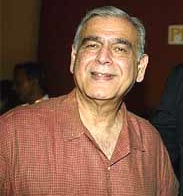 Ismail Noormohamed Abdul Reh. In his career spanning three and a half decades, he has made some 40 feature films. Many of them made with the collaboration of his pal, director James Ivory and writer Ruth Prawer Jhabvala.
Ismail Noormohamed Abdul Reh. In his career spanning three and a half decades, he has made some 40 feature films. Many of them made with the collaboration of his pal, director James Ivory and writer Ruth Prawer Jhabvala.  Annan's High-level Advisory Group and the External Advisor to the Director General World Trade Organisation (WTO), is regarded as one of the foremost international trade economists of his generation.
Annan's High-level Advisory Group and the External Advisor to the Director General World Trade Organisation (WTO), is regarded as one of the foremost international trade economists of his generation. 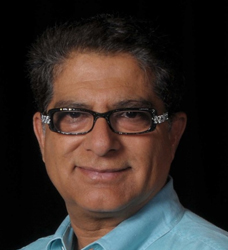 edicine in the US. Dr. Chopra serves as the Director of Education at the Chopra Center, which offers training programs in mind body medicine. He has established a new life giving pattern which has a crucial connection between mind, body, spirit and healing. Chopra is also known as the prolific author of more than 35 books, 100 audio, video and CD-ROM titles, which have been translated into 35 languages with over 20 million copies sold worldwide.
edicine in the US. Dr. Chopra serves as the Director of Education at the Chopra Center, which offers training programs in mind body medicine. He has established a new life giving pattern which has a crucial connection between mind, body, spirit and healing. Chopra is also known as the prolific author of more than 35 books, 100 audio, video and CD-ROM titles, which have been translated into 35 languages with over 20 million copies sold worldwide. 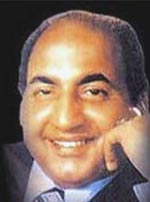 He started learning music from the famous Hindustani singer Chotte Gulam
He started learning music from the famous Hindustani singer Chotte Gulam 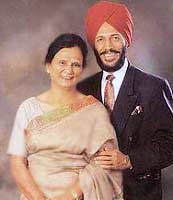 In 1957, he established a new national record of 47.5 seconds in 400 meter race. In the Third Asiad held at Tokyo (Japan) in 1958, Milkha Singh set two new records in 400 meter and 200 meter races respectively. In the 4th Asiad held at Jakarta (Indonesia), Milkha Singh won a gold medal in the 400 meter race. In 1959, Government of India honoured Milkha Singh with 'Padma Shri' for his notable achievements in the field of sports. Milkha Singh at present is fully dedicated to the promotion of sports in India.
In 1957, he established a new national record of 47.5 seconds in 400 meter race. In the Third Asiad held at Tokyo (Japan) in 1958, Milkha Singh set two new records in 400 meter and 200 meter races respectively. In the 4th Asiad held at Jakarta (Indonesia), Milkha Singh won a gold medal in the 400 meter race. In 1959, Government of India honoured Milkha Singh with 'Padma Shri' for his notable achievements in the field of sports. Milkha Singh at present is fully dedicated to the promotion of sports in India.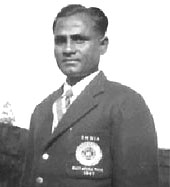 Pradesh). He joined army at the age of sixteen. He started playing hockey in army and was included in the Indian Hockey team for the 1928 Amesterdam Olympics.
Pradesh). He joined army at the age of sixteen. He started playing hockey in army and was included in the Indian Hockey team for the 1928 Amesterdam Olympics. 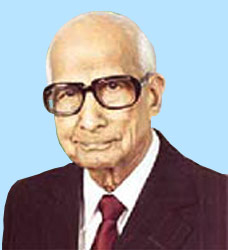 G.D. Birla was a great architect of
G.D. Birla was a great architect of 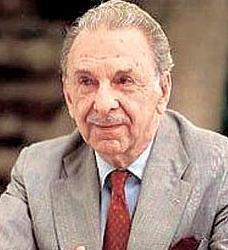 Dadabhoy Tata. He spent much of his childhood in France since his mother was French. In 1922, Tata returned to India to join the family business. He inherited most of his grandfather Jamshedji's industrial empire but first became a pioneer in aviation. He had a great personality with a charm and style of his own.
Dadabhoy Tata. He spent much of his childhood in France since his mother was French. In 1922, Tata returned to India to join the family business. He inherited most of his grandfather Jamshedji's industrial empire but first became a pioneer in aviation. He had a great personality with a charm and style of his own.